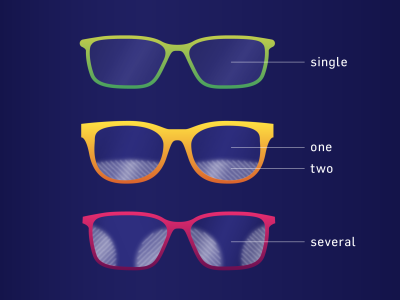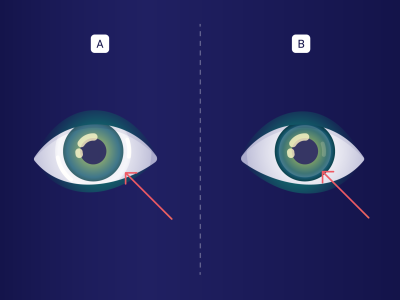Free online eye sight test
Complete an eye sight test in 2 minutes!
Browser support: Chrome, Safari, Edge and Firefox

Glasses, contact lenses, eye operation – what should I choose?
Blurred vision, perhaps accompanied by tired eyes, headaches and sore neck muscles are typical discomforts if your eyesight is not as it should be. Below is a description of what you can do to make sure you have the best possible eyesight.
Eyeglass lenses are optical lenses that can change the direction of incoming light, thereby moving the image formation in the eye onto the retina. If you are short-sighted, you will need diffusing lenses that diffuse the image formation backwards onto the retina and sharpen the image. The strength is always indicated with a minus (-). If you are long-sighted, you will need converging lenses that move the image formation forwards. The strength for long-sightedness is indicated with a plus (+). If you have astigmatism, you will need cylindrical lenses that can correct distorted image formation.
When you are young, you can see all distances as long as your astigmatism has been corrected. When you become older, your glasses will need different strengths for different distances such as short, intermediate and long distances. Therefore, when you are older, you will need different eyeglass lenses as listed below:

Contact lenses are special lenses that swim in the tear film covering the eyeball. If you are very short-sighted or long-sighted, you will see better with contact lenses than with glasses. However, many people use contact lenses because they do not like wearing glasses, or because glasses are inconvenient for sports, when it is raining or when coming inside from the cold.
There are several different types of contact lens, but they can roughly be divided into two types: hard and soft. Hard contact lenses rest on the clear cornea of the eye in front of the iris (the coloured ring around the pupil), while soft contact lenses cover the cornea, but rest on the conjunctiva and therefore are slightly larger than the cornea.
Good hygiene is important when you have contact lenses, otherwise you risk eye infections. Therefore, always wash your hands before handling your contact lenses. Regardless of the type of contact lens, you should have your contact lenses and your eyes checked regularly by an optician.

Most of us will need reading glasses when we reach 40-50 years. This is because the lens of the eye becomes less flexible with age, making it more difficult to change focus. You will typically experience that your eyesight is exactly as it always has been, except when you need to read or see close objects. Perhaps you take off your glasses if your are short-sighted, or you have to hold the object you want to see or the text you want to read at arm's length to be able to focus. In other words, reading glasses are glasses only used for reading, knitting or if you need to focus on an object close to you for some other reason.
As your eyesight is constantly changing, the strength of your reading glasses will undoubtedly also have to be changed over time. An optician can help you with this through an eyesight test.
Many of us have to sit for many hours a day in front of a computer at work. Reading on a screen is very static for the eye, and this can lock the focus of the eye and cause various problems. For example, you can experience that your vision becomes blurred, that your eyes burn or become red, that you have a feeling of heavy, tired eyes, or you become sensitive to light. You can also experience seeing double for short periods. This discomfort can be remedied by using computer glasses that relieve your eyes when you look at a screen.
If you are already using glasses and you do not have any problems focusing on close objects, you can easily use your regular glasses or contact lenses when working at a screen. However, if you have glasses with a reading field or multifocal lenses with invisible transition, you may need computer glasses, as the reading field in computer glasses is located higher in the lens, is wider and has been adjusted to the distance to your screen. If you are using glasses with a reading field or multifocal lenses with invisible transition to read your screen, you may unconsciously tilt your head backwards to see the screen, causing pain and tension in your head, neck and shoulders.
Regardless of whether or not you use computer glasses, it is recommended that you look away from your screen at appropriate intervals, for example look out of the window to relax the close range focus of your eyes.
Many clinics offer different types of eye surgery that can make your eyesight normal without glasses or contact lenses. This surgery is also referred to as "eye treatment", "lens surgery treatment" or "laser eye treatment". This may sound tempting. However, there are a number of factors you should consider before you decide to undergo eye surgery, as any surgery entails some risk that can be avoided if you stick to using glasses or contact lenses.
Laser surgery on the cornea (laser eye treatment) corrects the cornea for short-sightedness, long-sightedness and astigmatism. The laser changes the curve of the cornea. Flattening the curve of the cornea corrects short-sightedness, increasing the curve corrects long-sightedness, and removing corneal tissue to correct an asymmetrical curve corrects astigmatism.
A laser can change the shape of the cornea in two ways: By removing a slice of the corneal tissue with one type of laser beam, or by removing tissue from the surface of the cornea with another type of laser beam in order to change the shape of the cornea.
Lens replacement surgery (lens surgery treatment) replaces the natural lens of the eye with an artificial lens. To avoid having to wear glasses, a multifocal lens that diffuses the light for a variety of focal lengths is inserted, enabling the patient to see objects at long distance and intermediate distance, and to read. This can cause problems when you become older, as the retina's light sensitivity and ability to see contrast deteriorate with age.
In order to utilise the close range focus of the lens in young people, it is possible to correct an eye defect by inserting a sort of contact lens on top of the biological lens behind the iris and the pupil.
There are several risks associated with eye surgery. The eye can become infected, and there is always some uncertainty as to how close the surgeon can come to the neutral point and thereby achieve perfect vision. Surgery in the eye entails a life-long higher risk of retinal detachment, and this can threaten your eyesight. If you are older than 40 years, you will often need reading glasses after eye surgery, and as the refraction of the eye changes throughout life, there is also a risk that you will need surgery again or have to wear glasses permanently. Therefore, you should always consider carefully whether the inconvenience of wearing glasses or contact lenses outweighs the risks above.
Only you can decide the best vision correction for you. An optician or an eye care specialist (ophthalmologist) can advise you.
Complete an eye sight test in 2 minutes!
Browser support: Chrome, Safari, Edge and Firefox
